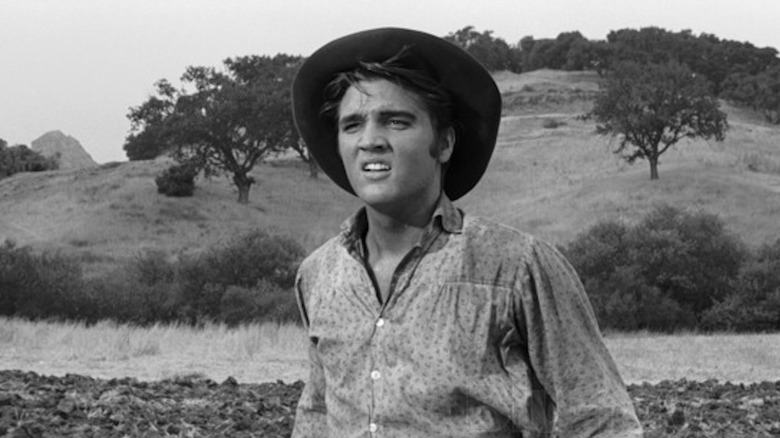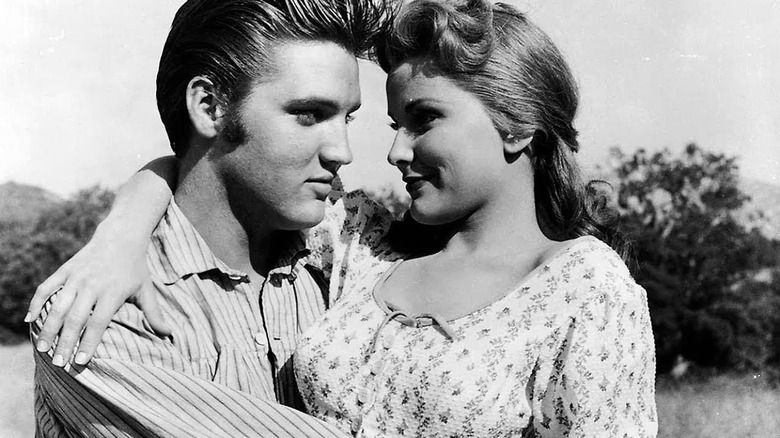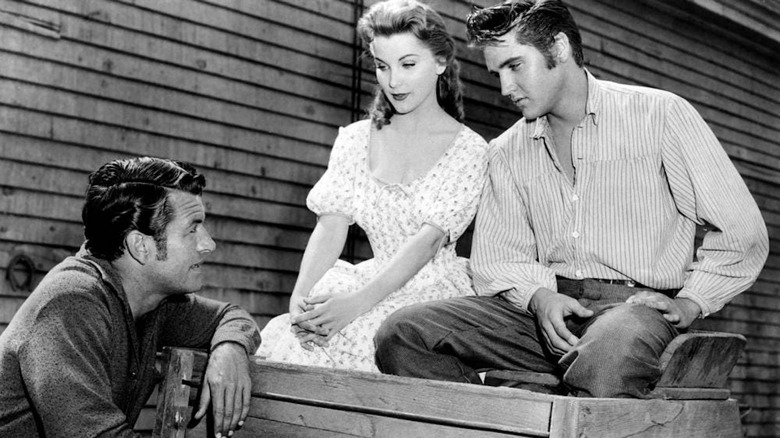How Fox Stole Elvis Presley's Big Screen Debut Out From Under Paramount
Thanks to Baz Luhrmann's electrifying 2022 biopic "Elvis," fans new and old (some very old at this point) have enthusiastically delved into the cultural icon's past to get a more nuanced understanding of how this Tennessee-born mama's career took so many unexpected turns before he collapsed in a pharmaceutically-induced heap at the age of 42.
Every chapter of Presley's life is packed with decisions both brilliant and personally/professionally self-destructive. Indeed, his tragic arc might just be the definitive showbiz cautionary tale. His was an incandescent (if highly derivative) talent that attracted opportunists and admirers; he was treated as a product, and, thus, had an awful tendency to treat those who genuinely loved him with the respect and tenderness they deserved.
Speaking of tenderness, Presley's value as an entertainment commodity was, at its early peak, so dizzyingly high that he could work around his newly signed contract with Paramount Pictures before he even made a single movie for the major studio. How and why did he pull this off? Like so many choices in Presley's career, he had just about nothing to do with it (outside of being Elvis).
Those in Elvis' purview wanted to strike while the idol was hot
According to Bernard F. Dick's 2021 book "Engulfed: The Death of Paramount Pictures and the Birth of Corporate Hollywood," Presley's manager/mentor Colonel Tom Parker inked a three-picture deal with Paramount that would earn the star $15,000 per movie. It was a coup for producer Hal Wallis, who envisioned Presley as more than just a novelty leading man; he fervently believed the entertainer possessed the potential to be a truly great actor.
Presley was open to the idea of challenging himself as an actor (he was especially keen on James Dean), but Parker and everyone else who stood to benefit from his popularity didn't care about the star's artistic ambitions. They just wanted him in front of a movie camera tout suite. Wallis understood the urgency, and thought he might have the perfect project for Presley's big-screen debut in an adaptation of N. Richard Nash's play "The Rainmaker." This was a problematic choice for two reasons: it was a star vehicle for Burt Lancaster and Katharine Hepburn, and Presley's part was a hick, which would've clashed with his high-wattage, sex object image.
As Wallace scrambled to find a replacement, Parker and Presley's reps at the William Morris Agency grew impatient. They had no idea how long Elvis' stardom would last (largely because many in the industry believed rock-and-roll to be a passing fad), so they pressured Paramount to loan their commodity out to 20th Century Fox for a low-risk B Western that, if nothing else, would likely pack the nation's movie theaters with the singer's rabid fans.
Paramount relented, which cost them a little in the short run but paid off handsomely in the long term.
Love me tender... and profitably
"Love Me Tender" was, conceptually, merely a programmer for Fox. The Robert Buckner-scripted film was based on the real-life exploits of the Reno brothers, a band of outlaws that executed a series of train robberies in the Midwest United States after the Civil War. Presley was cast as Clint, the youngest of the clan and most conscience-stricken.
Richard Egan is essentially the lead of the film as Vance Reno, but the filmmakers expanded Elvis' part, allowing him to sing four songs – one of which, "Love Me Tender," became the title of the movie and, most importantly, the star's signature ballad. Critics were unimpressed with the film, but several conceded that the red-hot teen idol's casting wasn't just a publicity stunt. He had a natural screen presence. He also had a built-in fan base that turned the movie into a hugely profitable hit for Fox.
Paramount couldn't have been thrilled with missing out on the Presley film that wound up featuring arguably his most famous song, but the studio had him under contract going forward and, once he wrapped "Love Me Tender," it put him straight to work (though it also loaned him out to MGM for "Jailhouse Rock"). Elvis made his best movie for Paramount (the Michael Curtiz-directed "King Creole"), and, according to Wallis, was the most dependable star of the 1960s: Elvis movies always turned a profit.
Sadly, Parker treated the movies as marketing efforts, so, aside from "King Creole" and maybe "Jailhouse Rock," we never got to see Presley play anything other than Elvis Presley. The films range from agreeably peppy (e.g. "Blue Hawaii) to tiresome, and eventually did more to sand down Elvis' once sharp edges. Business-wise, the powerful folks backing Presley's career got what they wanted, while all Elvis got was hooked on pills and dead.


